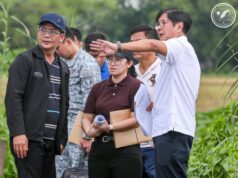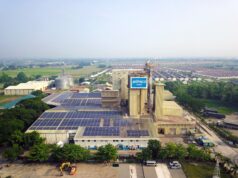CLARK FREEPORT – A noted economist has joined the ranks of those opposed to the Reproductive Health (RH) bill, saying that “population is an asset” and that poverty is the result more of wrong economic policies than big population.
Speaking before members of the Pampanga Chamber of Commerce and Industry (Pamcham) here recently, Bernardo Villegas, senior vice president and dean of the school of economics of the University of Asia and the Pacific, noted the ill effects of artificial birth control measures espoused by the RH bill in such countries as Thailand.
“Thailand is growing old too fast, thanks to the condomization of that country,” he said, referring to the extensive use of condom in the neighboring country.
Villegas also noted that the cases of HIV-AIDS in Thailand increased to about one million “after condomization.”
“Economic logic tells us that population is an economic asset if the government has the right economic policies,” he said.
Villegas noted that not even government corruption could solely be blamed for poor economic performance. He cited that case of India where he said corruption in government persisted, but nevertheless made economic strides.
He said the underlying factor in economic development consist not only of fighting corruption, but also liberalized investment policies that allow more foreign investors to come in, as well as policies that promote rural agricultural development.
“Indonesia surpassed us because they fought corruption by sending many to jail, including a relative of its president,” he said.
Villegas said that in the Philippines, positive economic growth could be sustained by amending economic provisions in the Constitution. “We have the most backward Constitution,” he said.
He lamented that the present Charter bars economic development by limiting the share of foreigners in local investments and barring them from owning lands where they could build their homes and factories.
“Of course there should be some limitations on foreigners, but why should we bar them from owning lands where they could build factories and homes if we are to attract them?” he asked.
Villagas urged the Aquino government to convene a Constituent assembly, and not a Constitutional convention, to be able to amend solely outdated economic provisions in the Constitution by 2013.
“In a way, this was done during the Estrada administration when a group of 30 people came out with such amendments contained in 300 pages,” he said. Nothing came of this as Estrada was overtaken by “People Power”.
With the right economic provisions in place, the Philippine economy would grow and by the time Aquino steps down from power in 2016, the government would be in better position to amend other parts of the Charter through a constitutional convention, he said.
At the same time, Villegas credited former Pres. Estrada for shifting economic policies towards countryside development. This, he said, was sustained by Mrs. Arroyo by pursuing infrastructure projects in the provinces, particularly the establishment of a nautical highway through the “roll on-roll off” barges that boosted trade between the country’s islands.
“Before Erap (Estrada), our government despised agriculture,” he noted.
Villegas said that his positive outlook for the economy is also based on the “impressive” members of the President’s cabinet whose “common denominator is honesty.”
“They are the right people,” he said.
Speaking before members of the Pampanga Chamber of Commerce and Industry (Pamcham) here recently, Bernardo Villegas, senior vice president and dean of the school of economics of the University of Asia and the Pacific, noted the ill effects of artificial birth control measures espoused by the RH bill in such countries as Thailand.
“Thailand is growing old too fast, thanks to the condomization of that country,” he said, referring to the extensive use of condom in the neighboring country.
Villegas also noted that the cases of HIV-AIDS in Thailand increased to about one million “after condomization.”
“Economic logic tells us that population is an economic asset if the government has the right economic policies,” he said.
Villegas noted that not even government corruption could solely be blamed for poor economic performance. He cited that case of India where he said corruption in government persisted, but nevertheless made economic strides.
He said the underlying factor in economic development consist not only of fighting corruption, but also liberalized investment policies that allow more foreign investors to come in, as well as policies that promote rural agricultural development.
“Indonesia surpassed us because they fought corruption by sending many to jail, including a relative of its president,” he said.
Villegas said that in the Philippines, positive economic growth could be sustained by amending economic provisions in the Constitution. “We have the most backward Constitution,” he said.
He lamented that the present Charter bars economic development by limiting the share of foreigners in local investments and barring them from owning lands where they could build their homes and factories.
“Of course there should be some limitations on foreigners, but why should we bar them from owning lands where they could build factories and homes if we are to attract them?” he asked.
Villagas urged the Aquino government to convene a Constituent assembly, and not a Constitutional convention, to be able to amend solely outdated economic provisions in the Constitution by 2013.
“In a way, this was done during the Estrada administration when a group of 30 people came out with such amendments contained in 300 pages,” he said. Nothing came of this as Estrada was overtaken by “People Power”.
With the right economic provisions in place, the Philippine economy would grow and by the time Aquino steps down from power in 2016, the government would be in better position to amend other parts of the Charter through a constitutional convention, he said.
At the same time, Villegas credited former Pres. Estrada for shifting economic policies towards countryside development. This, he said, was sustained by Mrs. Arroyo by pursuing infrastructure projects in the provinces, particularly the establishment of a nautical highway through the “roll on-roll off” barges that boosted trade between the country’s islands.
“Before Erap (Estrada), our government despised agriculture,” he noted.
Villegas said that his positive outlook for the economy is also based on the “impressive” members of the President’s cabinet whose “common denominator is honesty.”
“They are the right people,” he said.



